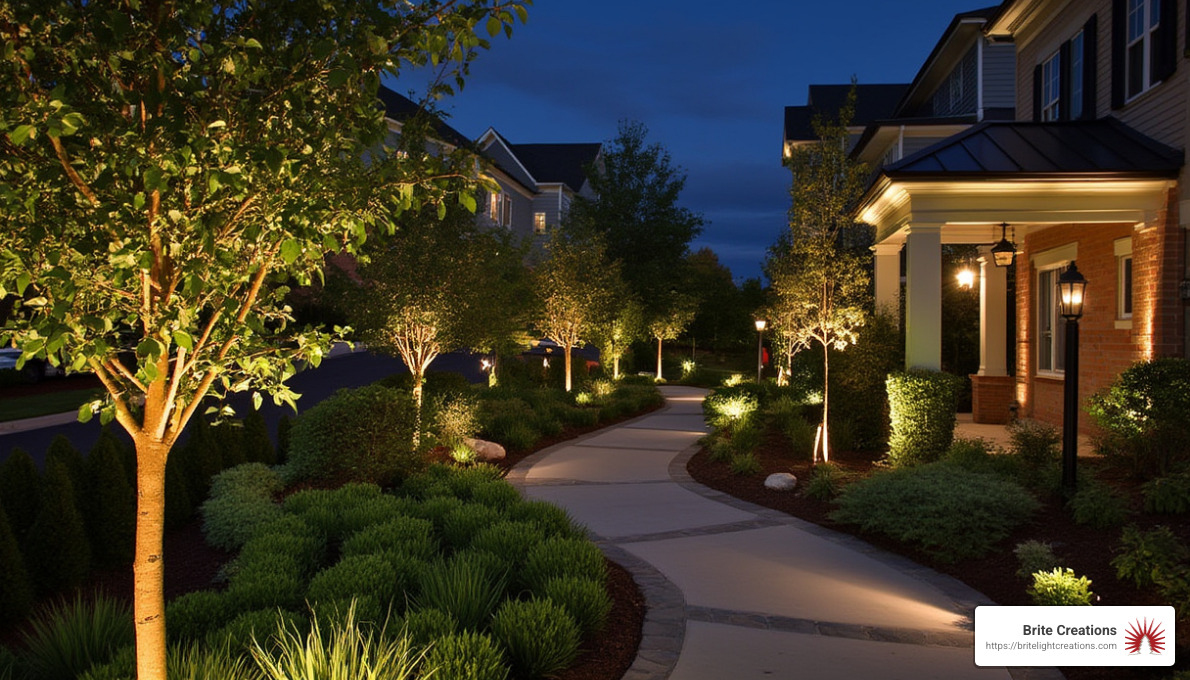Do You Need An Electrician for Outdoor Lighting? What Homeowners in RaleighShould Know
Outdoor lighting makes your home safer, more welcoming, and far more enjoyable after dark. If you are considering new fixtures on the porch, path lights in the yard, or bistro lights over the patio, you might be wondering how much of it you can safely install yourself. You are not alone. In this guide, you will learn when a DIY approach is fine, when a handyman is appropriate, and when a licensed electrician or professional lighting installer isthe right call. We will keep it practical and specific to Raleigh and the surrounding Triangle.
First things first, safety and code in North Carolina
Electrical work outdoors faces rain, UV exposure, insects, and temperature swings. That is why national and local electrical codes require weather rated components, GFCI protection, and proper burial depths for wiring. InNorth Carolina, outdoor receptacles must be GFCI protected and have in use covers. Low voltage landscape systems need listed transformers and weather resistant connections. Hardwired fixtures must be bonded andgrounded correctly.
If a project touches household wiring on a circuit breaker, penetrates walls or the roof, or requires new conduit or buried cable, you should plan on a professional. Code compliance protects your family, preserves warrantycoverage, and avoids costly rework during a home sale.
What you can install yourself
Plenty of outdoor lighting improvements are safe, simple, and rewarding if you follow the manufacturer’s instructions and basic safety.
- Plug in string or bistro lights. Use outdoor rated lights and extension cords, plug into a GFCI outlet, and keep connections off the ground and protected from water. Use guide wire for longer spans so the cord isnot bearing weight.
- Solar path and accent lights. These are low risk and do not require wiring. Place them in areas with sun exposure and away from mower paths.
- Low voltage landscape lighting with a listed plug in transformer. Pre made kits that plug into a GFCI outlet are designed for DIY. Lay out fixtures, bury the low voltage cable shallowly per instructions, and keep allconnections in weather rated housings. Do not splice into house wiring.
- Smart plug timers and Wi Fi outdoor switches. Choose outdoor rated devices, follow pairing instructions, and keep the plug area protected with in use covers.
If you are comfortable with tools and you stick to plug in or solar options, you can get excellent results. When in doubt, stop and ask a pro.
When a handyman can help
Handymen can be a good fit for non electrical parts of the job, along with simple fixture swaps that do not involve new wiring. Examples include:
- Mounting posts, poles, or pergola hardware for string lights or café lights
- Installing anchors, guide wires, or attachment hardware on fences and gazebos
- Replacing a light fixture one for one where wiring and the junction box are already present, provided there is no need to alter circuits or run new cable
- Digging shallow trenches for low voltage cable routing under professional direction
A handyman should not add new circuits, fish new cable through walls, install underground conduit, or modify the service panel. Those tasks belong to a licensed electrician or a professional outdoor lighting installer.
When you need a licensed electrician or professional installer
- Call a pro for any project that involves new wiring, code considerations, or higher voltage. Situations include:
- Adding or moving exterior outlets, especially for patios, decks, and landscape transformers
- Installing hardwired sconces, floodlights, and security lights where no junction box exists
- Running new lines, adding breakers, or upgrading your panel to support lighting loads
- Burying conductors or conduit to code required depths, and making waterproof splices
- Integrating lighting with whole home controls, photocells, and motion sensors on hardwired circuits
- Aluminum wiring, older homes with unknown wiring conditions, or moisture prone areas
Professional installers like Brite Creations specialize in low voltage, code compliant systems that look great and last. We design the layout, bury wiring safely, protect connections, and test every fixture. Our LED systems are energy efficient and backed by robust warranties.
Replacing an outside light, do you need an electrician?
If you are swapping an existing fixture for a similar one at the same location, and the box and wiring are in good condition, many homeowners can DIY. Turn off power at the breaker, verify with a tester, use weather ratedsilicone gaskets, and ensure the fixture is rated for wet or damp locations as required. If you find brittle insulation, corroded hardware, no ground wire, or a loose box, stop and call a professional. Safety comes first.
Can a handyman install lights?
Yes, for simple fixture replacements and non electrical mounting work. No, for new wiring, panel changes, or anything that requires a permit or inspection. When the scope grows beyond a one for one swap, you will wanta licensed electrician or a dedicated outdoor lighting company.
Common outdoor lighting paths in Raleigh
Here are typical routes homeowners take, with who to call:
- Patio ambience with plug in bistro lights and smart timer, DIY or handyman for mounting, pro consult if spans are long or attachments are tricky
- Low voltage landscape lighting around walkways and beds, pro design and installation for consistent brightness, buried cable, and transformer sizing
- Motion security floods at corners, electrician or pro installer if new boxes or wiring are needed, DIY only for direct replacements in good boxes
- Permanent architectural lighting for year round curb appeal, professional design and installation, including zoning and dimming for different scenes
If you want a seamless plan and one accountable team, consider a full service installer. Brite Creations handles design, installation, maintenance, and long term support in the Triangle.
Budget and value tips
- Start with a design. A plan prevents over buying fixtures and ensures even lighting.
- Choose LED. You get better efficiency, less maintenance, and long life.
- Protect connections. Weather rated junctions and heat shrink connectors prevent callbacks and failures.
- Think controls. Timers, photocells, and smart plugs save energy and simplify use.
- Invest in quality fixtures. Coastal finishes and sealed housings pay off in Raleigh’s humidity and summer storms.
Why homeowners choose Brite Creations
Since 2005, our Raleigh team has designed and installed durable, beautiful outdoor lighting that meets code and delights homeowners. We use high quality LED fixtures, bury or conceal wiring, and back our work withstrong warranties. Whether you want subtle path lights or a full backyard transformation, we make it easy with design, installation, and support.
If you are exploring options for landscape lighting raleigh, we are ready to help with a free, no obligation consultation.
Quick answers to your top questions
- Do you need an electrician to install outdoor lighting? You do for new wiring, panel work, or hardwired fixtures where no box exists. For plug in and solar projects, usually not.
- Can a handyman install lights? Yes, for mounting hardware and simple one for one fixture swaps. No, for new circuits or underground wiring.
- Do I need an electrician to replace an outside light? Not always. If the box and wiring are sound and you are swapping like for like, you can DIY. Call a pro if anything looks questionable.
- Can I install outside lights myself? Yes, for plug in string lights, solar lights, and low voltage kits with a listed plug in transformer. Follow instructions and use GFCI outlets.
Ready to light your outdoors safely and beautifully?
If you want code compliant, long lasting outdoor lighting with a smooth process, Brite Creations can help with design, installation, and maintenance across Raleigh, Cary, Wake Forest, and nearby towns. Tell us about your space, and we will bring your vision to life with reliable, efficient lighting. For seasonal projects, we also provide holiday lighting raleigh with professional design, installation, and takedown.
Summary: DIY works well for plug in and solar lights. Handymen can help with mounting and simple swaps. Electricians and professional installers are essential for new wiring, buried cable, and hardwired fixtures. When you want safety, performance, and a polished look, a trusted team makes all the difference.


